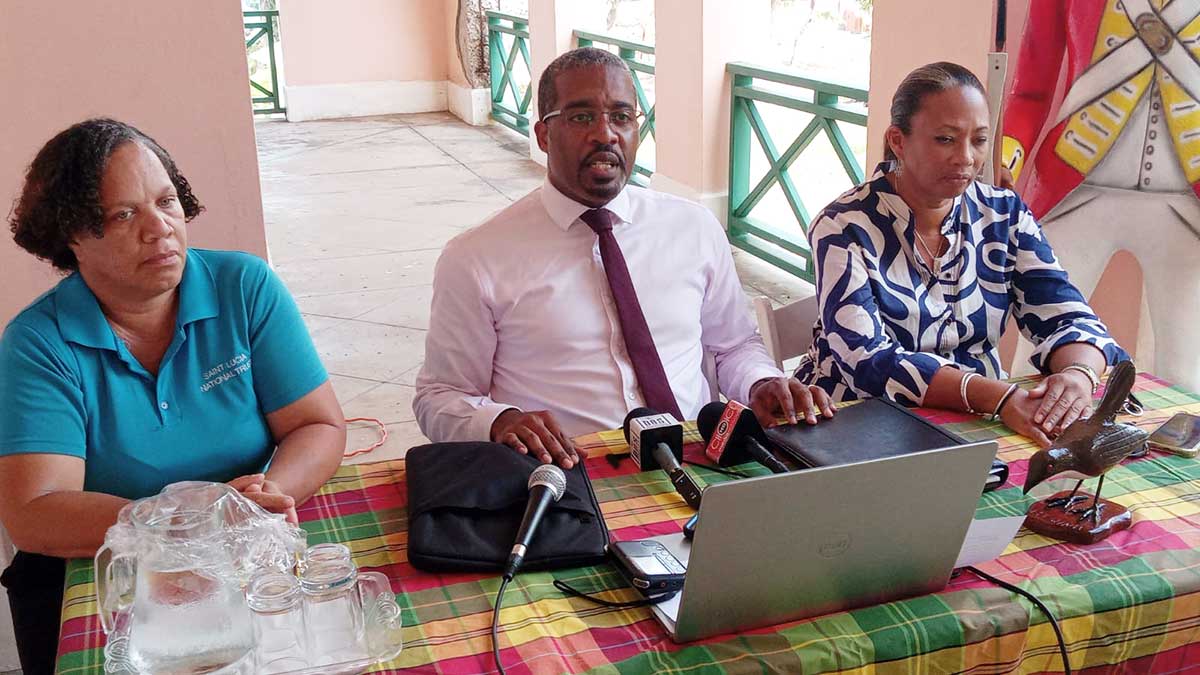
Executive Director of the Saint Lucia National Trust (SLNT) Jeannine Compton-Antoine has expressed support for the work undertaken by the unit’s management and staff to preserve the country’s landmarks, sites and heritage status.
She said that keeping the country’s cultural patrimony intact should be a priority of every Saint Lucian citizen. Patrimony is defined as land, property, historical sites or artifacts that have belonged to a country for many years, and as a reserve inherent to the natural habitat of a society.
SLNT personnel have sought to ‘break the ice’ on the issue concerning the use of the Pigeon Island National Landmark as a venue to host major jazz events.
With the success of the Jazz Festival and the increasing number of patrons to the event, she said in the medium-term an alternative location will have to be identified for mass crowd events, since the Pigeon Island National Landmark is getting too small to accommodate such large events.
“Pigeon Island is a heritage site and it has its own specific challenges that we have to address and adhere to …and there is specific legislation that guides everything that we do at Pigeon Island,” Compton-Antoine told reporters, at a media briefing, Wednesday.
Noting that the issue at hand requires a collaborative effort, the SLNT official declared: “We collectively, not (just) the National Trust, but we as Saint Lucians have to do everything in our power to protect our heritage assets and to protect our people when they are attending these mass crowd events.”
The SLNT is also a member of the Tourism Advisory Committee and “provides advice to the Ministry of Tourism,” on such issues relating to the hosting of mass crowd events, she added.
Additionally, the SLNT share in the ‘roundtable discussions’ held by stakeholders and event organisers, which include representatives from Events Saint Lucia (ESL), Saint Lucia Tourism Authority (SLTA), and other event promoters.
Pigeon Island National Landmark Council Chairman Leslie Prospere said this was “to ensure that the Jazz Festival occurred in a manner that was sustainable, not just for the festival (itself) but also for the Pigeon Island National Landmark.”
He stated that the venue was not designated to accommodate mass crowd events, though allocations have been made to host several major entertainment activities.
He disclosed that the SLNT employed the services of experts to assess the status of the venue to accommodate mass crowd events. The findings, submitted by Events Management expert Bernadette Albert was presented to the Festival management partners last August, which underscores the need for updated venue management strategies.
An update on the status of the Landmark’s “historical and conservation value” and the importance of its long-term sustainable use and to inform on the Statutory work of the Trust was the objective of Wednesday’s media briefing.
Prospere said it was important to clarify earlier statements made by the SLNT concerning the continued use of the Landmark as a venue for hosting mass crowd events.
Pigeon Island National Landmark was designated as a “National Park” in 1979, for the preservation of sites, buildings and objects of historic archaeological and architectural value, as well as for areas of natural beauty in Saint Lucia.
Consequently, Prospere stated, the SLNT is mandated by law, “to manage the island’s national, historic and natural heritage for the benefit of the people of Saint Lucia.”
He added: “Pigeon Island was never intended to be a mass crowd events space, and because of this the Trust has to consider the historical aspects of the site and patron safety at the forefront of its ethos, when it comes to hosting events here.”
Prospere noted that the SLNT continues to work collaboratively with the “government and event organisers through suitably qualified experts to identify various mechanisms for scaling down of these mass crowd activities to sustainable levels at Pigeon Island.”
The SLNT Council’s Chairman reiterated, the “development and implementation” of workable solutions to these challenges is a process that requires “dialogue, collaboration, and commitment” from all stakeholders. He said the SLNT will continue working with these stakeholders to “strengthen our relationship as we endeavour to ensure the sustainable use of the Pigeon Island National Landmark.”
Elliot said the SLNT’s function is not limited to the management of the PINL, but involves works undertaken at other sites towards “promoting the conservation ethos in Saint Lucia.”





![Attendees at the UHC logo and website launch [Photo credit: GOSL]](https://thevoiceslu.com/wp-content/uploads/2026/02/Attendees-at-the-UHC-logo-and-website-launch-380x250.jpg)






![Remnants of an alleged drug boat blown up in a lethal strike by the U.S. military last week surfaced off Canouan on Saturday [Photo credit : St Vincent Times]](https://thevoiceslu.com/wp-content/uploads/2026/02/Remnants-of-an-alleged-drug-boat-blown-up-380x250.jpg)
